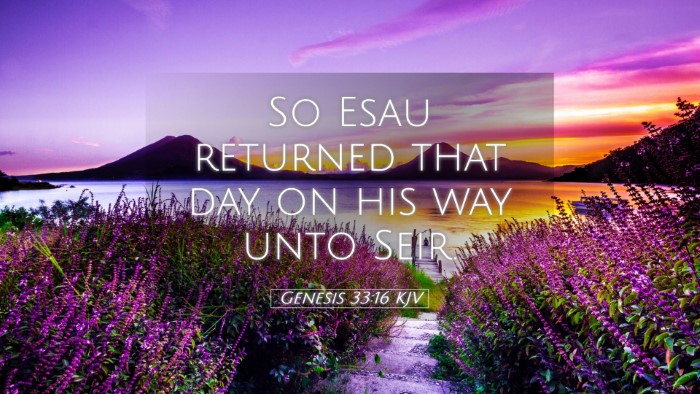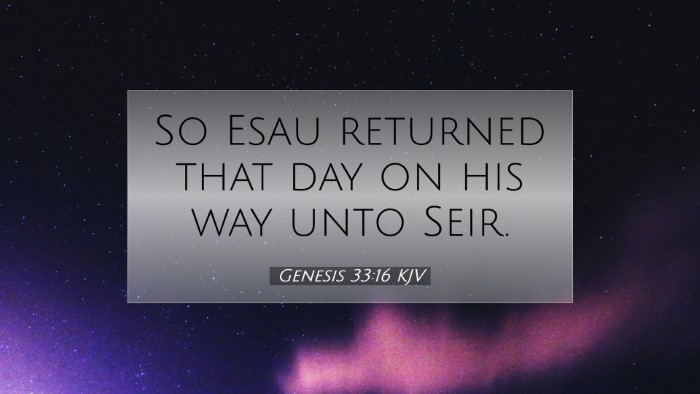Commentary on Genesis 33:16
Genesis 33:16: "So Esau returned that day on his way to Seir."
In this pivotal moment within the narrative of Genesis, we witness a significant reconciliation between Jacob and Esau, following years of estrangement and conflict. This verse is succinct but rich in implications regarding the themes of forgiveness, family dynamics, and the providential hand of God at work in human relationships. Below, we draw insights from renowned public domain commentators to expound upon its meaning and significance.
Historical Context
The encounter between Jacob and Esau is set against a backdrop of familial tension stemming from Jacob's deception and his flight from his brother's wrath. After years in exile, Jacob returns to a land that brims with memories of past grievances. This context is essential for understanding the depth of the emotional and spiritual dynamics at play in Genesis 33:16
Reconciliation and Its Implications
Matthew Henry observes that Esau's return to Seir following his meeting with Jacob highlights a significant shift in their relationship. While previously characterized by animosity and rivalry, this meeting marks a turning point:
- Forgiveness: The act of Esau embracing Jacob signifies a profound act of forgiveness, echoing the principles of reconciliation that are central to both the Old and New Testaments.
- Restoration: The restoration of their relationship sets an important precedent within the biblical narrative regarding the power of familial bonds and the necessity for healing.
Divine Providence in Relationships
Albert Barnes emphasizes the role of divine providence in moving the hearts of individuals towards forgiveness. This notion reiterates that God's sovereignty encompasses human affairs:
- Divine Influence: It is not merely chance that brings Jacob and Esau together, but rather God's hand orchestrating events for reconciliation.
- Human Agency: Both brothers demonstrate the agency necessary for mending broken relationships, showcasing that individuals play a role in fulfilling God's will.
The Nature of True Reconciliation
Adam Clarke offers additional insight into the deeper implications of their encounter, especially concerning the nature of true reconciliation:
- Humility: Jacob approaches Esau with humble acknowledgment of his wrongs, which Clarke emphasizes as essential for peace. True reconciliation often requires one to set aside pride.
- Generosity of Spirit: Esau's willingness to forgive suggests the necessity of magnanimity in human relationships. His actions reflect a spirit ready to extend grace, often pivotal for healing.
Lessons for Today
This brief yet profound verse offers numerous lessons applicable today for pastors, theologians, and believers alike:
- The Importance of Forgiveness: Forgiveness remains a cornerstone of Christian belief, mirrored in the forgiveness extended by Esau towards Jacob. It challenges contemporary cultures where grudges are often held.
- Restoration of Relationships: The narrative encourages individuals to seek the restoration of broken relationships, emphasizing that generations of animosity can be overcome through humility and love.
- God's Sovereignty: The reminder that God works behind the scenes to orchestrate reconciliation can provide comfort and hope for those involved in strained relationships.
Conclusion
Genesis 33:16 stands as a poignant reminder of the complexity of human relationships and the divine capability to restore and redeem. As Jacob and Esau part ways, the peace established in their interaction reverberates through their families and the broader narrative of God's covenant people. This moment invites reflection on our engagements with others—urging believers to embody the same humility, forgiveness, and grace demonstrated by the biblical patriarchs.


